Far Away Eyes’ Review: “Supernatural” 10.3 “Soul Survivor”
Disease has consumed the headlines in the last month—from the Ebola outbreak to the Enterovirus 68—and as a result we’ve seen fear and concern ratchet up for the nation’s safety, security, and health. But our fear dates much father back. Our fear of disease is perhaps one of our oldest—along with a fear of the dark. Nothing is more pervasive than disease—be it physical, mental, bacteria, cancer, or chronic. It does not discriminate between the affluent and impoverished. And nothing is more dehumanizing. Once someone is infected with the latest malady, they can be ostracized, seen as the monster hiding in plain sight. Supernatural has played with this theme before—most notably with Croatoan and Pestilence. But in “Soul Survivor,” we see demoniacal affliction and fading grace used as metaphors that allow us to have a poignant conversation about the ravages of disease. Most of all, it puts a distinct human face to it. Each character represents an aspect of disease’s effects: Castiel is the afflicted, Demon Dean is disease personified, and Sam and Hannah are the care givers. Through them, we can explore the emotional journey of disease.
First, however, what exactly is disease? It’s definition is rather clinical. The dictionary states that disease is: a disordered or incorrectly functioning organ, part, structure, or system of the body resulting from the effect of genetic or developmental errors, infection, poisons, nutritional deficiency or imbalance, toxicity or unfavorable environmental factors; illness; sickness; ailment.
Now that we know what it is, how does disease corrupt? We know that disease can be spread in various ways. Infections happen through touch, they happen through the air, they happen when bodily fluids mix. The genius of disease is that it has found so many ways to infect us—and most of them seem so invisible to us. It is the specter we all fear, waiting to pounce upon us in order to replicate itself. And it can permeate not only an individual, it can run through an entire population, changing and corrupting them along the way. In many ways, disease’s most powerful weapon is our own fear—and how we can allow it to dehumanize our fellow man—something we see so clearly in “Soul Survivor.”
All of this seems rather cold and unfeeling—and that is a truth about disease. It does not care—it simply is and it does what it must in order to survive and to spread. We’ve feared disease for this reason since we became aware. Even when we did not understand the fundamentals of what caused infection—lacking the scientific knowledge and tools to comprehend how it worked—we could see how disease managed to corrupt a population.
So far, season ten has given us examples of what it means to be human—showing our fragility, our ability to destroy, and our resilience. In “Soul Survivor,” we see them build upon these very themes in a new way. The use of disease is another example of how fragile we humans are. The definition alone gives us an example of how many different ways disease can effect us—and not for the better. And yet, it also allows us to see our own resiliency, too.
So, how does “Soul Survivor” capture this and turn it into a rich metaphor? How does it show our fragility and our resiliency?
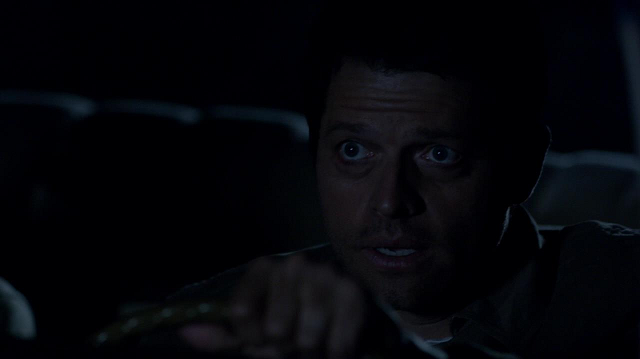
When we first see Castiel at the beginning of season ten, he’s resting fitfully in a bed. He’s exhausted and weakened. The angel is coughing often. He’s barely able to stand at times, wobbly on legs far too tired to carry him. He falls asleep at the wheel at one point, nearly sending his car careening into an oncoming semi. Castiel is exhibiting all the physical symptoms of a disease’s ravages. It’s etched in the weariness that seems to have permanently settled across his face. Castiel isn’t simply ill, however—he’s terminally ill. No beating around the bush will wish that fact away.
The disease here is fading grace—stolen from another angel—and as it slowly loses fuel like a star, it will burn itself out and die. Sadly, that means taking Castiel with it, and so he is enduring its death throes as his own. There are no good cures for this either—only temporary fixes. At this stage in its life cycle, we see that Castiel isn’t able to fight or to heal himself. The little bit of grace he has left is barely holding him together now. And he knows it.
Each step we’ve seen him take in his journey to help Sam with Dean shows the methodical decline of his disease. Not unlike a cancer patient watching the sands drain away in an hour glass, Castiel is watching his own time tick down to a trickle. He’s not able to move fast enough to meet the brothers at the bar Sam locates Dean in—and he’s certainly in no condition to make a mad dash to the Bunker to help Sam face down a demonic Dean.
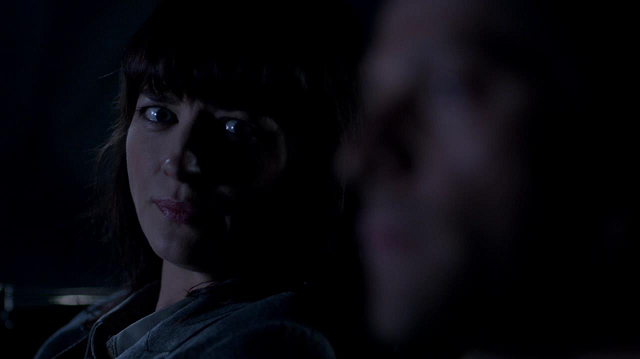
Several times, Hannah has tried to inquire how Castiel is really doing. Citing his Winchester training, Castiel replies every time with the standard, “I’m fine.” This is a bald faced lie—one Hannah calls him out on by saying, “You say you’re fine, but you don’t look fine.” Too tired to fight, Castiel replies, “That’s what the humans do. They say they’re fine and even if I—I don’t look it you say I look well and that way we avoid talking about something we can do nothing about.” He hopes that this will put the argument to rest. There’s nothing that can be done about his situation. And besides, stealing more grace would only delay the inevitable at the expense of another angel’s life. Replacing the fading grace he has now would only lead to him doing it again and again and again. To Castiel, that is no life.
But Hannah won’t hear of it. She’s caught, as a care giver, worrying about Castiel. She’s pained by his condition. No, she may not be experiencing the same situation. Her grace is fully intact. She’s still the angel she’s always been, but it’s hard for her to see him this way. So, she pushes back, telling Castiel, “I’m sorry, I just can’t see how Sam Winchester could ask you to drive all this way to help with his brother knowing your condition.”
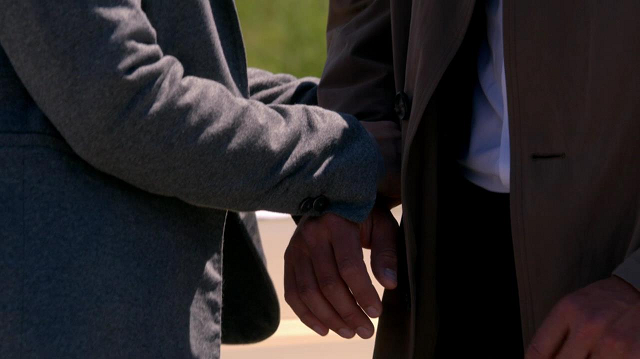
Like many facing a debilitating condition—especially chronic or cancer—Castiel is looking for something that he can control. He can’t stop his fading grace from destroying him. There’s not much time left to him, so rather than focusing on what he can’t do or how awful this is making him feel, he’d rather find a way to be useful. Many facing these types of diseases feel the same way. They don’t want to be viewed as someone to pity—someone that is too feeble to do anything for themselves. It’s not that he doesn’t care about himself—on the contrary, his determination to rush to Sam’s aid demonstrates that he wants to be seen as useful and needed. It matters not that he’s really in no condition to truly help.
It’s why, when Hannah pushes yet again, Castiel tells her simply, “Sometimes enough is whatever you have.”
For him, he knows that he will have to make do with the grace he has left—and if the last thing he should do is help Sam save Dean, then he will not have lost his fight to the ravages of his condition in vain. He will have left the world a better place and gone down—as he’s been taught to do by the Winchesters so often—swinging. Castiel would much rather do this than “slit some angel’s throat.” To simply steal another’s grace is seen as cowardice.
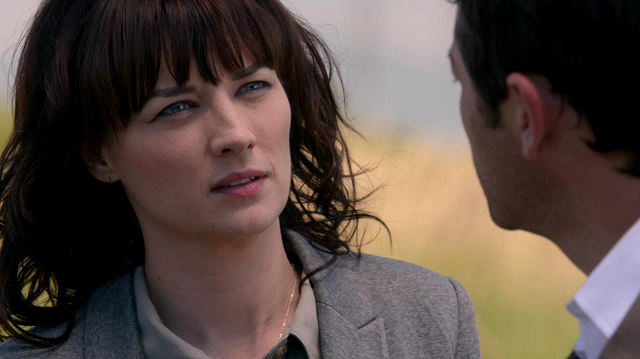
But Hannah doesn’t agree. As Castiel tells her that they must keep their priorities straight, she tells him, “I’m clear on my priorities—and yours.” For Hannah, she is watching a loved one give up. She tells him that he’s “noble” for choosing to die for his “principles,” but tells him that it’ll ultimately end up being “meaningless.” It just doesn’t make sense to her that he would rather throw his life away in order to save someone else.
There’s no way she can save Castiel on her own. It’s a heartbreaking realization for a being that has been considered one of the most powerful in creation. Angels are supposed to be able to heal. They’re supposed to be able to do almost anything. Instead, she’s watching one decline and burn out—choosing death rather than a second chance. Hannah is still watching, as the care giver, concerned for her friend and would be leader. She can’t fathom why he’s so bent on death when angels need him to guide them. Her emotional journey with him is one full of grief, anger, and disbelief. She is watching him fade away, little by little. Even though he’s physically with her in the car, she can clearly see that he’s dying. Her angry outbursts—cold at times—come from her fear that he won’t last much longer. She’s outraged that not only has Castiel continually lied about his condition with her—-he never told Sam how bad it was before the younger Winchester asked him to come help.
Castiel’s fading grace captures all the pain and emotional strife that not only the terminally ill face—it captures all of that for those that love them, too. Hannah is struggling just as much. His disease—fading grace—may not be able to infect her, but it most certainly does affect her. In the short time that she’s been friends with Castiel, she’s found herself growing to care for him. It’s why she tells him as she heals his wounds, “I just want to help, is that wrong?” It’s why she is so frustrated with him at the gas station in “Soul Survivor.” She tells him, her voice clipped, “You don’t have to be kind.” Her outburst here is rooted not in actual anger at Castiel—it’s rooted in her fear for him and of the disease permeating his body.
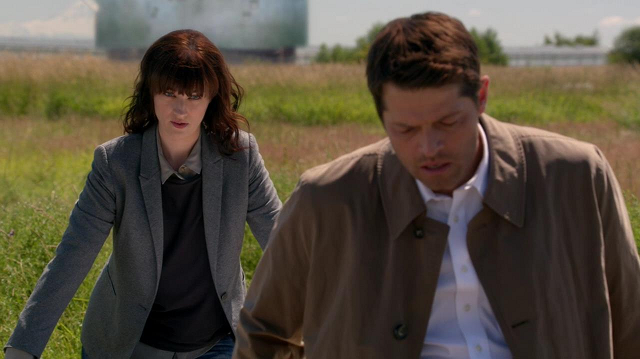
We’re watching, in Hannah, what so many care givers and loved ones feel everyday when faced with an ill loved one—helplessness. She can’t do anything, and yet she continually keeps asking Castiel if he’s fine, trying to push him into doing something, anything, about his situation. And when he patiently keeps trying to tell her that the only thing that’s important is the “mission” and that emotions are “temptations,” she cant help but lash out at the very person she’s worried about. It’s one of the most difficult things about disease—the way that it ripples outward and claims everyone in its vicinity.
Castiel is clear with her when he says, “No detours of any kind.” He knows that she may go for the second option available in her efforts to save him—one that is worse than the first: The Scribe of God.
Metatron is the only other card on the table for Castiel. If he were to go to the former Scribe and make a deal for his grace in exchange for Metatron’s freedom, he’d have his problem solved. But Castiel knows that is no answer. It would only lead to more problems. He knows that Metatron’s cruel words, “Dead man walking” are true—and while he may not relish the idea of his death nor want it, he knows that they must face the facts. They can’t do anything about his problem, and so he goes about trying to gently nudge Hannah towards acceptance of the facts. He will die and there’s nothing they can do about it now.
That is, until the King of Hell arrives to remedy the situation.
Hannah and Castiel make a pit stop to fill up Castiel’s car. As she goes inside to pay, Hannah realizes the scene is off—it’s far too quiet and there’s no one behind the counter—no one alive anyways. Adina, the angel that managed to flee in the skirmish at the river, has decided to seek a little pay back. She wants to execute them in retribution for Daniel’s death. Holding Hannah at knife point, she waits for Castiel to enter the station to make her moves.
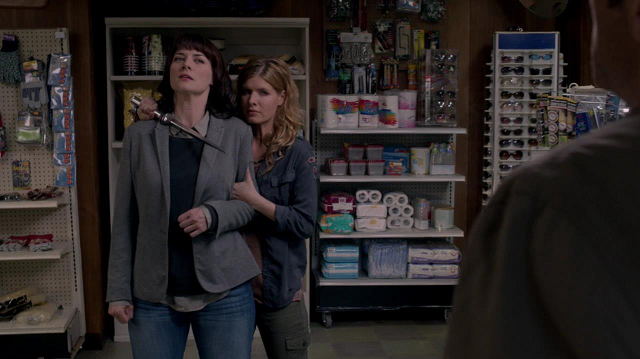
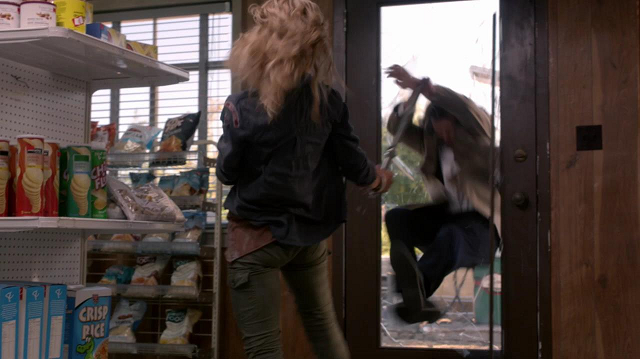
Angry and hurt, she attacks Castiel, pummeling the weakened angel unable to muster enough strength to fight back into the ground. She’s furious and will take anything she can get out of his suffering. But she also wants to target Hannah. While Castiel’s down for the count, unable to so much as crawl away, she resumes her assault on Hannah. She is so preoccupied with beating the other angel that she doesn’t realize that Crowley is behind her until it’s too late. She turns to face him, surely to launch an attack, only to have her throat slit open and her grace poured out into a bottle.
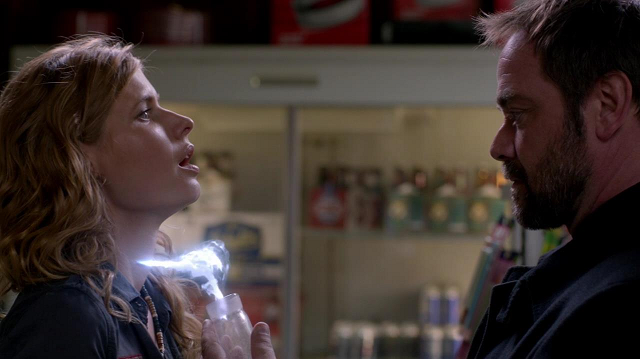
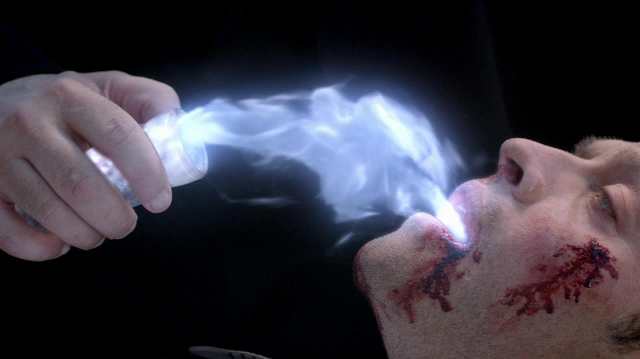
Crowley makes the decision for both Hannah and Castiel. He needs the angel alive so that he can help Sam with Demon Dean—despite being the creator of Demon Dean. His motivations are sketchy—considering the fact that he wistfully longed to go back to that time while resuming his duties. And yet, here he is, leaning over the beaten Castiel and forcing upon him stolen grace that will replenish his fading reserves.
In this way, we see Castiel’s storyline become foreshadow. He’s an indicator that what Sam’s doing in the Bunker will work. He’ll manage to cure Dean. And yet, his foreshadow is far more subtle perhaps. Castiel’s disease has been cured, yes—but temporarily. He’s now strong enough to heal, to kill, to fight back, and to hold back a demon if need be, yes—-but for how long? How long will his remission last?
This is the second time he’s now taken another angel’s grace into his vessel to replace his own—stolen by Metatron. Will this grace wear down faster than the last? Crowley’s actions may have stayed his execution, but Castiel knows that the time is still ticking away—he’s still diseased. He’s not all better. He’s not restored to his former self.
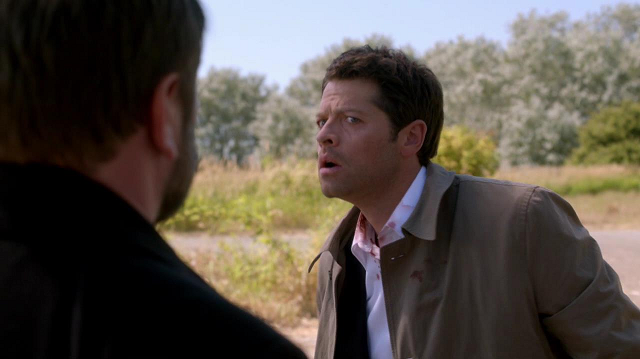
And now, Castiel has to also wonder what Crowley’s true motivations are. Crowley may tell him, “Dean’s become a handful. Having him as a demon has been nothing but grief. Fix the problem.” Castiel’s no fool. He has to know that this is masking some new machination the King of Hell is cooking up. After all, he did put a lot of time and effort into making Demon Dean—now to turn against him seems bizarre. It raises all sorts of red flags for the newly restored angel—but he has no time to ponder this about face from the King of Hell. He must do what he’s set out to do since Sam called: help save Dean.
Besides, Castiel is still very much preoccupied with his own problem. This new grace masks the truth. Underneath the power it provides, it merely masks the fact that he is still the sick and dying angel we met at the beginning of season ten. He’s still fading out, he’s still afflicted.
But if Castiel is the afflicted—-and the foreshadow for Demon Dean—just what is Demon Dean?
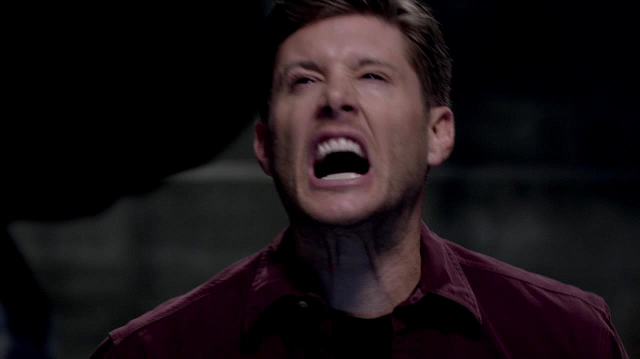
Demon Dean is disease itself made flesh. Unlike the other times we’ve seen people in the past sport black eyes—including Sam—Dean is not possessed. There’s no chanting Latin and sending the demon back to Hell. There’s no burning away a binding link as they did with Sam to release Meg. The demon inhabiting Dean’s body is not from Hell. It’s Dean’s soul, trapped inside his own body, twisted and mangled into a new and terrifying form. It’s polluted by what the Mark of Cain and First Blade have done to it—born upon his death at Metatron’s hands. Demon Dean, therefore, is disease personified into a cruel and vicious creature seeking to do what disease has done since the beginning of time: anything it needs to in order to survive.
We see it in the moment that Sam walks into that room and faces his “brother” strapped into the chair centered in the middle of the giant Devil’s Trap in the Bunker’s dungeon. As he raises his head, the shadows fall away to reveal his face. We can see Demon Dean calculating every move he needs to make in order to escape and to eliminate the threat to his very existence. He will say and do anything it takes—no matter the cost. He will destroy, he will infect, and he will corrupt anything and everything in order to survive.
Demon Dean may be disease in the flesh, but he still carries all of the real Dean’s memories and knowledge. He still carries all of Dean’s buried emotions. In this manner, we are seeing how disease can pollute. The real Dean may, on some level, feel some of the things that Demon Dean expresses. He certainly harbors some of these darker desires—as we all do in some shape or form. This new version of Dean—the “lean mean Dean”—is a corrupted version.
We watched Castiel, afflicted with the fading grace, decline physically. Here, in Demon Dean, we see how this can be done mentally and emotionally. Demon Dean doesn’t have the same emotions. He doesn’t have the same inhibitions. The make up of Dean that makes him who he is has been burned away by this demoniacal affliction. Instead, we see his emotional structure altered. Guilt is discarded. Demon Dean knows some of his actions and words have been cruel—he simply doesn’t care. He’s not weighed down with worry or pain. Demon Dean, in his corruption of the real Dean, the disease replicating itself and replacing its host, has chosen to latch onto qualities that suit its purposes. He has transformed Dean into a being with the drive to survive and to corrupt. Furthermore, he takes great pleasure in it.
Demon Dean’s calculating enough to use the intimate knowledge of the real Dean against Sam in an effort to be released. If he thinks it’ll work, he’ll say or do it. He starts by offering to leave Sam alone, that he’ll simply go and live his life some where else. He tells Sam that they don’t have to do this, that he hates needles, that he doesn’t want this—all attempts that are meant to break Sam’s will.
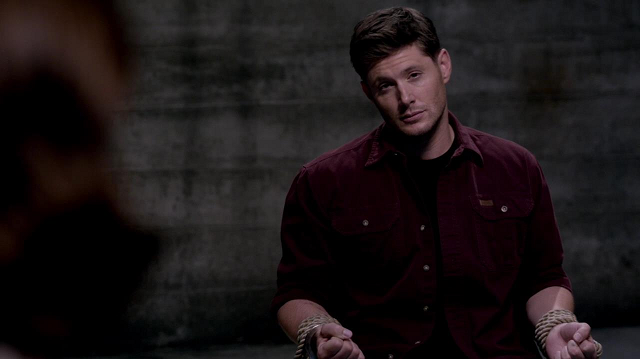
When this doesn’t work, he tells Sam, “Oh it’s the real me alright, the new real me, the me that sees things for what they really are. Winchesters. Do-gooders fighting the natural order. Let me tell you something. Guys like me, we are the natural order. It’s the way it was set up.”
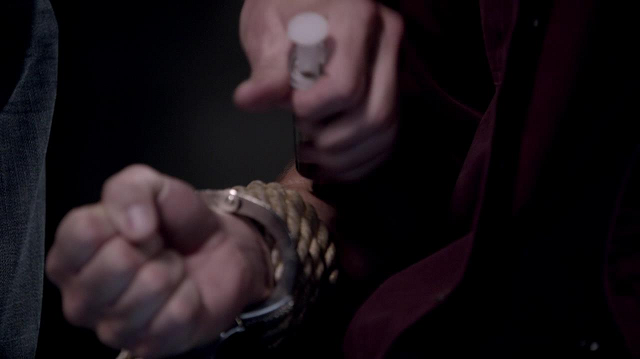
This isn’t Dean talking. This is the disease fighting back. It’s right in his statement about the natural order. Disease, for better or worse, has always plagued us or other organisms on the planet. Blights hit plants. Infections run through herds of animals. Flus afflict everything from birds, to pigs, to humans. It may be cold and clinical in its methods, but it exists in a sense to cull and to control populations—and to replace those populations with their own. We see this in Demon Dean’s own statement to Sam. He is the disease meant to replace Sam’s brother.
But it’ll take much more than this to dissuade Sam from administering a cure. It’ll take adapting to sway the younger Winchester in any way from his chosen path. He’s declared boldly and forcefully already, “I don’t want this!”—only to be told by Sam, “I already figured that out.” It still got a needle shoved into his arm.
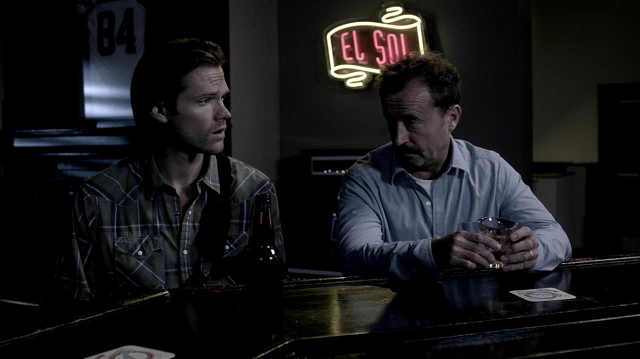
So, Demon Dean turns to some other emotional truth he can corrupt Sam with. He will pull on heavy hitting revelations. We watched him brutally kill Lester—all for calling him a punk ass demon no less—and now we learn the awful truth about how Lester just happened to be in that car in the first place. Demon Dean knows that Sam feels guilt—a concept he understands but does not feel. Disease, after all, has no guilt. It just is. And so, to perhaps persuade Sam to let him go, he tells him about what he knows. Sam was the one that nudged Lester at a crossroads demon in order to summon one. None would answer him—and in his desperation, he offered up another person in order to snag any leads. It cost Lester his soul—and his life—and to stick the knife in deepest, Demon Dean simply states, “Who cares what you meant. That line that we thought was so clear between us and the things that we hunted, ain’t so clear is it? Wow, you might actually be worse than me. I mean you took a guy at his lowest, used him and it cost him his life and his soul. Nice work.”
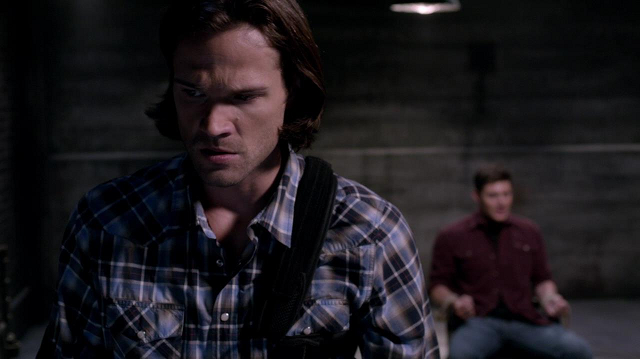
This makes Sam sway momentarily. After all, he never meant for it to go that far—he was going to stop Lester before he could make a deal. No one was supposed to get hurt in this. It was never Sam’s intentions—and he will carry that guilt with him for the rest of his life.
But Sam also can’t stop. The disease must be dealt with. He can’t turn back now, and so he musters up enough strength to deflect this revelation. He administers another dose of the sanctified blood, knowing it’ll cure his brother from this awful affliction. It’s the only way he knows how to bring the real Dean back from under the black pollution corrupting his soul.
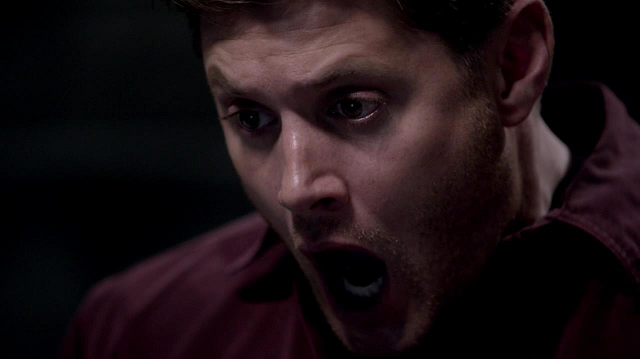
As disease personified, though, Demon Dean doesn’t react to the cure as expected. He wasn’t lying, when he told Sam that he wouldn’t sit in this chair like Crowley and get “weepy.” Instead of becoming more and more mollified, Demon Dean starts to scream in pain, he fights his binding, and he looks absolutely terrified for the briefest of moments. We watch his face closely, and we can see that the cure is starting to work—but painfully.
To try again in an attempt to stop Sam from curing him, Demon Dean digs deep to find the worst thing he can say—something that will be so cruel and so malicious that it’ll push Sam away. He needs to use Sam and Dean’s emotional history against Sam, and so he tells the younger Winchester coldly, “You notice I tried to get as far away from you possible? Away from your whining, your complaining. I chose the King of Hell over you. Maybe I was just… tired of babysitting you. Or always having to yank your lame ass out of the fire, since… forever. Or maybe — maybe it was the fact that my mother would still be alive if it wasn’t for you. That your very existence sucked the life out of my life.”
Instead, it has the opposite results. Sam, angered by this creature claiming to dig up long buried emotions and using them against him, ends up jabbing him with another painful injection.
The cure, over time, leads his blood to boil and makes him look weak. He lapses into and out of consciousness briefly. And with each dose, we see him get worse rather than better. His snarls, his pants, and his face clearly indicate that the cure is attacking the very root of the disease and that it is winning—but at what cost?
In some ways, this cure becomes like chemotherapy for cancer patients. The disease can ravage quite well on its own, but the actual treatments can make the patient feel almost worse than before. It can make them feel like they’re further corrupted rather than made pure. It can make them feel a fresh violation all over again. The adage that sometimes the cure is worse than the disease comes to mind—but only because we’re seeing the actual disease react on the surface level of Dean’s face—we can hear it in his pained screams.
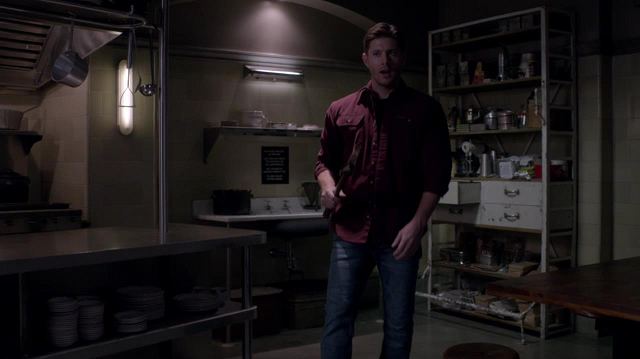
But it also has another effect that neither brother saw. The disease may have been weakened by the treatments, but Demon Dean is able to take his fight for survival to another level. He’s not merely stuck in the chair. Enough of the human blood has replaced his demonic, and he’s able to break free of his binding and the Devil’s Trap.
If the cure is meant to destroy him, Demon Dean will merely destroy the one forcing it on him instead.
A cat and mouse game begins with Demon Dean stalking the halls of the Bunker, invading its space with his physical presence in every hall way and in every room as he seeks his target. Here, we see the metaphor of disease take on a new level. He’s pervasive in his search. The place that was once considered, the “safest in the world” has suddenly become the most dangerous—all because it’s now infected with a disease that seeks violence and death.
This leads to emotional exchanges between the brothers as Sam attempts to lock Demon Dean in a room—but the disease isn’t doing this simply because he knows it’ll hurt Sam to say and do these things. He’s doing what he must in order to survive. When Sam counters yet again with resuming the cure, Demon Dean simply snaps back, “You act like I want to be cured. Personally, I like the disease.” Since he is disease, there’s no reason he would ever want to be cured. It would mean the end of him.


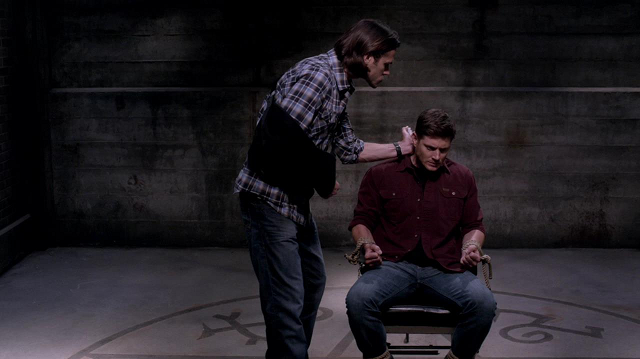
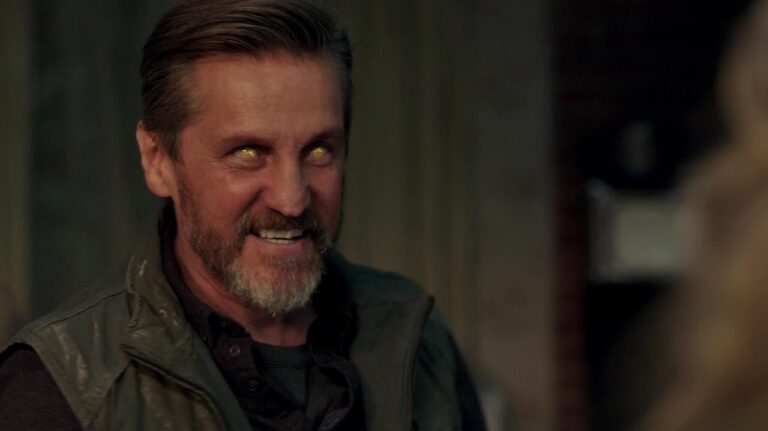

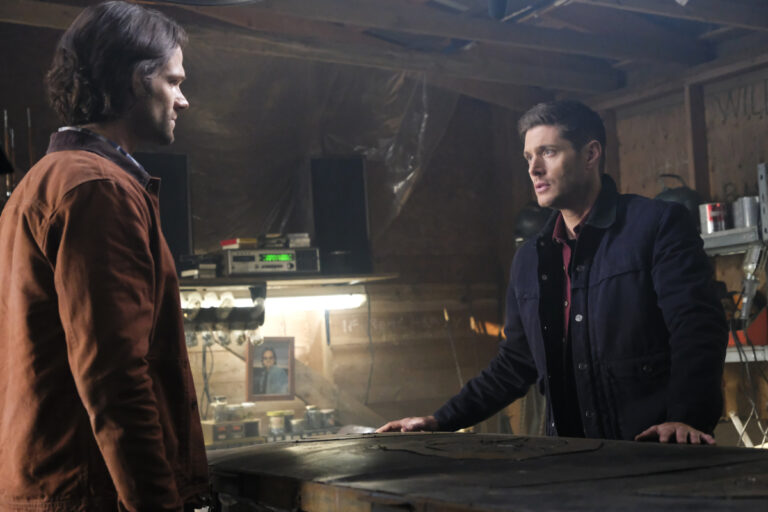
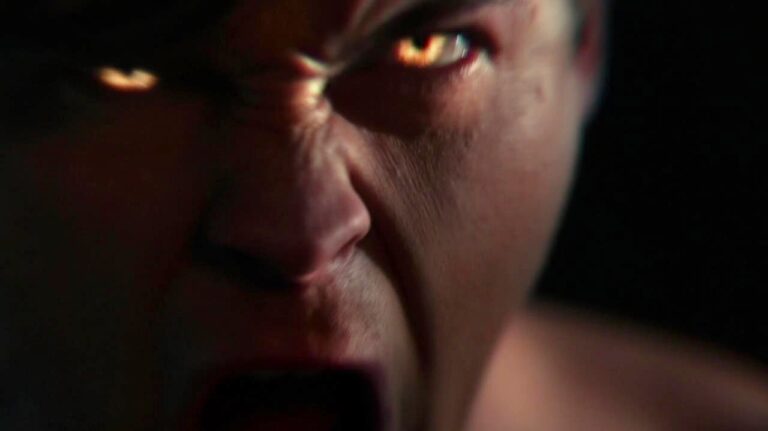
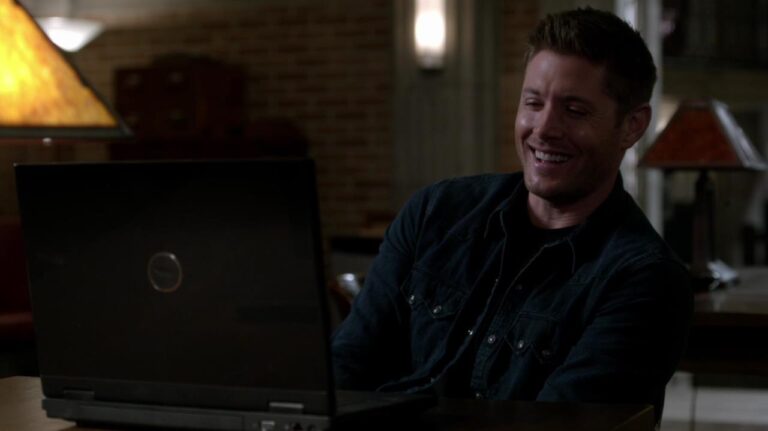
Thank you for this incredible review. I think the analogy of dd being disease itself is dead on balls accurate. 😀 I agree with every word. There have been complaints that the cure was anticlimactic because sam didn’t reach dd on an emotional level. how can you reach disease on an emotional level, when disease doesn’t know emotion. disease exists to destroy and spread and survive any way it can. I totally agree with your take. I think dean is in a remission. dd likened to cancer is a perfect analogy. As long as dean has the moc, he’s susceptible to that disease once again. the only real and permanent cure for dean is getting rid of the mark. the only one who can help dean do that. the only one who will remain at dean’s side, assuring that dean not fall prey to this disease again….the one who will be with dean every step of the way til they find cain and be rid of the moc forever is Sam. Sam brought his brother back to human status yes….but there’s so much more for sam to do to help dean. I think you’re right. i think sam in the dr. coat is a metaphor for the part he’ll play….he will be dean’s caregiver. he’ll be there to keep dean human, he’ll try to find the cure….which is cain himself. During the process of trying to save dean, these boys will heal and support ea. other and their bond will grow even stronger. it’ll be their bond that will save dean. it will give him strength. it will help him endure.
I look forward to watching this journey.
🙂
Thanks for the great comment.
The more I processed the episode, the more it just seemed like they were setting up for down the road in the remainder of the season. It all clicked when I first looked at Castiel’s situation. He was given new grace, but his problem isn’t fixed. He’s still stuck without his own grace and so we’re left to wonder how they’ll fix his problem. And then I thought about the Mark of Cain, and it just made sense that Demon Dean might not be all gone.
I think that you might be onto something. Sam may have to find Cain and get him to help him with Dean. Is there a way to remove the Mark? He knows they must find a way to do that, but how? And how does he go about finding Cain if Cain doesn’t want to be found and the spell they used was a one time deal?
I also wonder if Dean will end up as he was right before his fight with Metatron. The Mark was making him extremely ill. He was coughing up blood after he failed to kill Gadreel. Will the Mark do this to him again? The Mark’s really the root of his problem. I feel that Demon Dean was the Mark of Cain made personified. Until we saw him awake with black eyes, the Mark made Dean angrier and more violent, but it was just that thing on his arm. After he died, it took him over and entered the driver’s seat so to speak. I feel that’s what we saw in the chair—that Sam wasn’t talking to Dean entirely. He was talking to the Mark. And no, there’s no way for Sam to connect emotionally with something like that. For me, I found the emotional story in how Sam reacted to the exchanges—and I see it setting up more emotional exchanges now between Sam and Dean as they go forward.
I, too, look forward to seeing how the brothers take this situation to strengthen their bond. It’s so very early in the season, and I think there’s so many more ups and downs left for the Winchesters. I can’t wait to see each up and each down. I have a funny feeling there’s going to be a lot of Winchester angst and bonding and everything else in between to come!
Thanks again.
I was thinking that dean in his demon state made him stronger and thus healed his body. I don’t know if dean will be as extremely ill as he was right before his fight with metatron, or if he’ll revert back to how he was feeling when he first got the moc. the mark started to change dean, but it wasn’t until he touched the blade that the power of the mark increased. the blade and moc worked together….without dean being in contact with the blade, I wonder if he’ll be affected by the moc at a slower rate as he was in the beginning before he came in contact with the blade. I have a feeling dean will be having a hard time. I think it will be up to sam to reach beyond the mark and be dean’s touchstone….his no. one…his connection to his own humanity.
I agree that sam’s emotional story was in regard to his reaction to the exchanges. I have no doubt that there will be more between them as well. I think this is where the healing begins and it starts with the support they will give ea. other. 😉
I don’t know how difficult it will be to find cain. the last thing cain told dean was to come back and kill him once he killed abbadon. now I think cain is the only one who can take the mark back….it’s just a matter of whether he’s willing to do it or not when the time comes…and if not, what will the boys do next.
I wonder if Crowley fits in there somewhere because he still has the blade. really am curious as to what Crowley’s angle is this season:D
Hmm. You might be right. The Blade isn’t in his hands, so the Mark may not be as powerful in its corruption of Dean. I wonder, though, if now that he’s gone through this change once if that element will ratchet up further with or without the Blade. Dean may not get sicker or cough up blood, but what if he becomes more aggressive as they hunt and he kills monsters? It’s possible that the Mark might feed on that even if he’s not using the Blade at the moment. I do think that the Blade is the key for the Mark to unlock Demon Dean, but I have no doubt the Mark is doing something in the meantime while it waits for the Blade.
I agree. Dean will have an incredibly hard time. He’s going to remember everything he did as Demon Dean and what lead to those moments. I love that he’ll have to turn to Sam in this emotional journey—but what I love more is that Sam and Dean will have to turn to EACH OTHER in order to work through this. That’s going to be the powerful story of this season as we get deeper into it. I have no doubt that I’ll need tissues often!
Cain wants Dean to use the Blade on him. Right now, though, Dean doesn’t have it. He keeps tabs on things even in his retirement. He has to know that. So I don’t know that he’ll reach out to Dean until he knows that Dean has the Blade again. He may try to stay in hiding from them so the other demons and such don’t bother him. He doesn’t want to kill yet again and break his promise further to Colette. That being said, I think Cain may be a key in getting rid of the Mark. He’s probably thought about how that can be done himself. He’d know if you can or not by now. But, can he take it back? I don’t know. I can’t wait to see how they figure out how to get rid of it and truly cure Dean. I love that it’s going to be Sam and Dean against that Mark to do it, too.
As for Crowley, I think he’s large and in charge of things here. He’s the one that created Demon Dean. And then he ended up giving him over to Sam and sending Castiel to help. I don’t buy for a single minute that he wants Demon Dean eliminated or neutralized. I think he’s up to something far more sinister than we know. Maybe he needs to see if Demon Dean can resist the cure or make Dean into a sleeper. Crowley is up to no good. He misses Demon Dean clearly in those flashbacks, so I can’t fathom why he’d destroy his creation. I can’t wait to see what he’s really cooking up. It won’t be pretty!
I agree….with everything:D
edited for double post.. 😉
I was waiting very eagerly what was your intake and from what point you would research the episode and boy I wasn’t disappointed. I think this is your best yet and also it is in most regard what I thought about the episode. I have almost a gut feeling something bad is where they are heading. Maybe it is because we are not really spoiled or know much where the story is going. We don’t have a big bad so what if it turns to be Dean? Etc, it might be or might not be.
It was really hard for Sam and Dean’s reaction was hidden a bit behind a shroud. He acted more like stunned so the emotions were more hidden behind that. With Crowley… I will never ever trust what he is up to. He has gotten us all up on our toes and we like it. We don’t trust him.
Thank you again for the insightful review.
– Lilah
Thanks for the comment.
I’m so glad you enjoyed my take on this episode.
I think there’s Winchester Luck to consider. There’s on doubt in my mind that there’s another shoe yet to drop for the brothers. And I think it’s going to get darker when we get into the heart of the season. I wonder if you might be onto something or that he’ll at least be one of the major foes of the season.
Yes, Sam’s emotions were running high in this one while Demon Dean hid us from Dean’s. I think we’ll see Dean’s real emotions as we go deeper into the story and I can’t wait to see how they explore that between the brothers.
And Crowley? He’s pulling strings on the boys. I swear. I never ever take anything he does on face value. He always has an agenda and a game in mind that will benefit him. Whatever he’s up to won’t be good for Sam and Dean in the long run, that’s for sure!
Thanks again so much!
Super review!!! The ‘disease’ comparison is so spot on. Even down to Sam in the white coat. I agree with everything said so I won’t repeat it all. Such an insightful comparison and such deep thoughts. I almost have to chuckle. I wonder if the writers were thinking any of this because it’s such an appropriate overview of it all. Love your take.
I have one question for you Allison? Does your brain hurt after writing these? You obviously put a LOT of thought and analysis into these reviews. Thank you!!
Thanks for the comment.
I’m so glad you liked my take. I’d love to ask the writers what was deliberate in conveying the metaphor of disease in this episode and what’s simply coincidental. It’d be really neat to hear their take.
For writing these reviews, I find that I can’t let it go until I’m finished. It takes a lot of time, yes, and a lot of thinking, but for whatever reason I find myself unable to let it go until I’ve figured out what the episode was saying to me. It’s a weird compulsion. I know. And, I admit, this one got a lot longer than I expected. But no, my brain doesn’t hurt afterwards. I actually feel satisfied when I can finally hit post.
I hope you’ll like the rest of my reviews the rest of the season, and thanks so much!!
Okay, second attempt to post a comment. Hoping for success:p
I loved this review so much! The disease analogy and the season’s themes of human frailty and resilience in particular resonated with me.
Seeing Demon Dean as the physical manifestation of disease is perfect. I cannot wait to see how this plays out now that he has regained some of his humanity… because, as Cas so helpfully pointed out to Sam, there is still the Mark. Dean’s journey throughout this episode was very well done, and I applaud the writers for managing to squeeze that all into one episode (my only minor complaint about this episode is that it was a bit rushed, and I think it would have played out a little better as a two episode arc). Jensen, of course, knocked it out of the park both in front of and behind the camera.
In reading other opinions and reviews I’ve noticed some dissatisfaction with this episode, with complaints of how the cure seemed too easy, and that there was a lack of emotion between the two brothers. To me, this could not be farther from the truth. Purging the demon out of Dean is just the beginning of the long road toward “fixing” Dean. In keeping with the disease analogy, curing the demon was like removing a tumor. It was dramatic and an immediate difference was appreciated after, but aggressive cells still lurk in the body necessitating a more complex and drawn out treatment, like chemotherapy. After the cure, Sam and Dean were both physically and emotionally wrung out. They were relieved that this part of the battle had been won, but were both aware that there is an even bigger battle yet to come, and were both gearing up for it. I’m very excited to watch the brothers’ journey play out over the season as Sam fights to keep Dean human.
I was also very intrigued by the way Crowley and Cas mirrored each other in terms of human frailty and resilience. Crowley was still dealing with some residual human feelings, and it was apparent in this episode, that he was very emotionally frail indeed. His pining for Dean was at times hard to watch (for me) because the Crowley I love to hate is pure evil. The moments where he lets his humanity show through (reliving his misadventures with Dean) are fascinating to me, but also spark feelings of wrongness. Though Crowley was, for much of the episode, mentally weak, he was still physically strong. His strength and powers were intact. I was happy to see him make his choice and seemingly leave any lingering humanity behind (much as Dean did last episode) when he re-graced Cas and directed him to get read of Demon Dean one way or the other. His theft of Adina’s grace and subsequent murder of her was chillingly cold, calculated, and matter of fact. In comparison to other characters, Crowley rarely gets his hands dirty, but when he chooses to, he always proves more than capable.
Cas, on the other hand, was physically frail. Terminally so. He was barely able to remain standing upright, let alone use any of his powers. And yet, he was still mentally sharp and sound. He knew exactly what was happening to him, and was unwilling to compromise his moral code just to save himself. His determination to help the Winchesters caused him to push himself beyond what he was physically capable of in his journey to reach them, and he never lost sight of his goal, but was also unwilling to sacrifice an innocent or make a desperate deal with Metatron to achieve it. This is much needed character growth for Cas, and I hope it continues. Even as he lay dying after Adina’s attack, he still resisted Crowley with all he had, determined not to once again be powered by stolen grace. His feeble struggles with Crowley were heartbreaking, as was the look of pure anger in his eyes that he directed at Crowley after the grace took hold.
So, yes. That was my very long winded way of saying that I liked the human resiliency and frailty ideas.
I like that you include an analysis of the actors’ performances in your reviews. This cast is so talented, and they add so much to their characters. Jared, Jensen, Misha, Mark, and Erica all did a phenomenal job this episode.
Thanks again for the great review!
-thestorygirl
Thanks for the wonderful comment after another attempt!
When I first sat down with this episode, I considered the concept of survival first. My second viewing made me see what Demon Dean was trying to do. He did all he could in order to survive. I had to attack it from the perspective of what the characters wanted. Once I could piece that together I could then delve into what that survival meant. It hit me, then, that Demon Dean had to be disease itself and the rest fell into place.
I absolutely agree. Demon Dean may be disease personified, but what Sam did was remove a tumor or a virus. The aftermath of that is yet to be seen and if and when Dean should relapse will be a major story point going forward. I was rather pleased that we saw the brothers kinda retreat to an extent at the end from one another. Sam needed a breather to get some normalcy back. We’ve seen him run and get Dean food before, so for him to do that made him feel grounded even more. Here was his chance to know for sure that his brother is truly back. He can go get him some greasy burger and chide him on his eating habits and feel normal. For Dean, he was just waking up from the horrors of what happened, and I found that powerful in that scene in his room. I could tell that he was scared that he was going to relapse any moment or try and kill Sam or anything. I think it’s going to be a rocky road for the boys going forward.
I took a lot of Crowley’s situation to be an indication that he’s cooking something up. He’s not just handing Dean over to Sam and saving Cas so Castiel can arrive in time to save Sam so Sam can finish the cure. I got the impression that he wanted Demon Dean back. And he’s now waiting his time for whatever it is he’s spinning to come to fruition. I also got the impression he was bored as hell doing all the mundane stuff that he probably used to love doing. In some ways, I kinda saw his behavior to be like someone going back to work after a long vacation. In many ways, he hasn’t really “ruled” Hell in at least a year. He was in the Bunker on lock down or binging on blood or hanging with Demon Dean all this time. I have no doubt that once he gets past the house cleaning Crowley will get back to going all evil kick ass—as we see him do with Adina. I loved that he showed up, told her that she’s done enough and before she can so much as lunge, he’s already ripped her grace out. The kill shot after was just brutal. I can’t imagine what Crowley’s cooking up next, but it won’t be pretty.
And yes, Castiel was so powerful for me this week. It’s so terribly hard to see someone who is terminally ill and learning to accept that fate. Be it a matter of months to live or a chronic condition, it’s so difficult on every level. I absolutely loved how angry Castiel was with Crowley after he got new grace. You’re right. He was so feeble at that moment. I felt so bad for him and my heart hurt so much as I watched that scene. I almost wonder if we would have seen Castiel dead by episode end if not for that intervention, but even so, Castiel had made his choice and knew he didn’t want this. I wonder how we’ll see that element of the story play out going forward.
I always include the actors in my reviews. I typically start there because it helps me to see the story in pieces rather than as a whole so I can unravel it and then weave it back together. I’m always glad others like my inclusion of them in the discussion. I may not be an actor, but I appreciate the story telling they do. And so far, season ten has really had some great performances that really make me think and feel and that’s a mark of great television.
Thanks again!
great post. 😉
I know this is going to be a rocky road for the boys but I can see the positive in this situation. mind you , this is not a good situation…not at all….but when it’s over, I do see the boys growing stronger and closer because of it.
the boys will not only be of support for ea. other, but they will come to understand ea. other, really understand ea. other, for what I think will be the first time. i so look forward to that. it’s not only about dean understanding why sam was so upset about the possession, by experiencing himself the loss of control of his actions….”being essentially taken over” and doing things he would never do….there’s more to it. it’s about the boys literally living in the other’s skin so to speak. his whole life sam had this poison in his body and he had to live in a way he saw fit so not to fall victim to the monster inside him. i always found sam to have a sympathetic and gentler sort of nature. i think a lot of that has to do with the fear of what he could become. based on what sam told dean in the great escapist, even as a child he felt impure. that he could never go on a quest like sir galahad. sam has basically spent his whole life living with this demon blood and since s4 the actual fear of what could become of him…both he and dean especially feared that. dean has always been the normal one…he’s the one who had watch out for sam, to make sure sam stayed not only safe, but that sam stayed sam.
now for the first time the roles are reversed. sam is the normal one now. dean is the one with the poison in him….he’s the one with the inner monster that can take over at any time. dean is the one who has to be more aware of his behavior now, perhaps even become more gentler for fear of what he can become if he isn’t. sam is the one who now has to watch out for dean, and not only to keep him safe but to ensure that dean stays dean.
i just think that as awful as this situation is….the good that will come out of it will be a stronger bond. the boys will come to understand ea. other, i mean really understand ea. other and with that come to accept ea. other as they are. this situation will bring them closer and they will be able to come to see ea. other as equals. i think that’s a very good thing. 🙂
I agree wholeheartedly. This is the first time Dean will have to face the monster inside him—and it’s not just his self esteem or the fear he’d already be just a killer as he feared before. Now he has to fear that he’ll be this violent monster that has no humanity left. And Sam will have to do what he can to stop that from happening. It’s a rather beautiful twist in the story and I think it’ll lead to the brothers seeing not only one another with fresh eyes but themselves. It’s so early in the season and we don’t know yet just what’s in store for them, but I’m so eager to see how this story unfolds for them. It’s going to be such an emotional roller coaster.
I finally got a moment to sit down and read your review. Wow! This is probably the best review I have read on this episode. You did what you always do with this show and took all of the layers and laid them out so they made perfect sense. Almost every other line I kept thinking of course why didn’t I see that it was there in plain sight. Thank you so much I really enjoyed this episode. This is a wonderful companion piece that should be read after viewing “Soul Survivor”.
Thanks so much.
I’m so glad you loved my take on this one. It touched me on so many personal levels and I really wanted to make sure I managed to capture this episode correctly. I’m so glad I could bring out some layers for you. I love that people read these things and can see something new or different. I love when I do the same reading other people’s thoughts, too. It makes the story that much richer. I am so glad you feel this review is a great companion for the episode and I hope I can write another great review for you next week.
Thanks again.